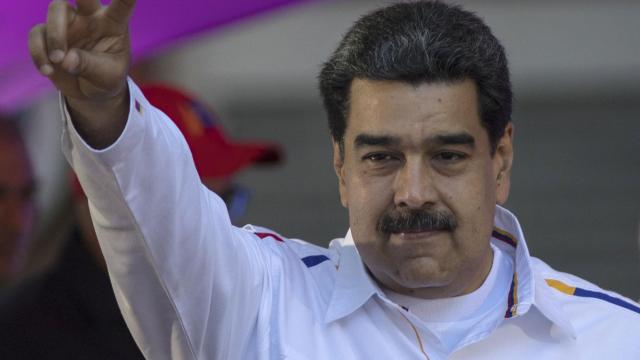BOGOTA, (Reuters) – The United States targeted Venezuelan President Nicolas Maduro’s government with a fresh round of sanctions today after violence blocked the delivery of food and medicine to the economically devastated country during the weekend.
The Treasury Department said it was sanctioning four pro-Maduro state governors, blocking any assets they control in the United States as Vice President Mike Pence said the aid blockage had steeled the United States’ resolve to support opposition leader Juan Guaido.
Speaking at the beginning of a meeting with Latin American allies expected to bring new measures against embattled, Pence said the United States would stand by Guaido until freedom was restored to the oil-rich nation.
The new sanctions announcement came as Pence and Guaido met with members of the Lima Group, a bloc of nations from Argentina to Canada dedicated to peaceful resolution of the Venezuelan crisis, in Bogota.

“We are with you 100 percent,” Pence ahead of the start of the meeting. “I want to assure you, President Guaido, the tragic events of this past weekend have only steeled the resolve of the United States to stand with you … We will keep standing until your libertad is restored.”
While it will look for ways to increase pressure on Maduro, the group is likely to reiterate its opposition to the use of force at the meeting in Bogota, attendees and diplomatic sources said.
At least three people were killed and almost 300 wounded during protests and clashes on Saturday as U.S.-backed aid convoys attempted to enter Venezuela to deliver food and medicine.
Guaido, sitting next to Pence at the meeting, asked for a moment of silence for those killed in what he called the “massacre” of the weekend.
Guaido, recognized by most Western nations as Venezuela’s legitimate leader, has urged the bloc to consider “all options” in ousting Maduro.
Unlike the Lima Group, of which the United States is not a member, the Trump administration has so far declined to rule out the use of military force.
But Peruvian Deputy Foreign Minister Hugo de Zela Martinez denied there was any division in the group over the use of force.
“We have the responsibility to redouble and intensify our support,” Colombian Foreign Minister Carlos Holmes Trujillo said as the meeting began. “Venezuelans have never advanced so much towards the recovery of their democracy.”
The convoy of trucks with food and medicines was blocked during the weekend by soldiers and armed groups loyal to Maduro, who retains the backing of China and Russia, which have major energy sector investments in Venezuela.
Maduro says the aid efforts are part of a U.S.-orchestrated coup against the OPEC member.
Trucks were met with tear gas and rubber bullets. Two went up in flames, which the opposition blamed on security forces and the Venezuelan government on “drugged-up protesters.”
The opposition had hoped Venezuelan troops would balk at turning back supplies so desperately needed by a population increasingly suffering malnutrition and diseases.
The Trump administration last month put sanctions on state-owned oil company Petroleos de Venezuela, known as PDVSA, to cut Maduro off from his government’s main source of revenues.
The group has previously asked the U.S. to impose an oil embargo on Venezuela, a Peruvian diplomatic source said.
The Chilean delegation is expected to push to maintain dialogue with Maduro but also to back commercial sanctions and further blocking of Venezuela’s participation in international groups, Chilean media reported.
Brazil’s vice president has previously insisted that there is no military solution to the crisis.
